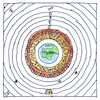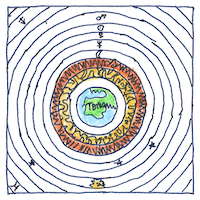Aristotle
philosophy of science

|
Science
The first scientist in history, Aristotle turned from Plato’s philosophy to empiricism writing books on aesthetics, biology, ethics, politics and government, linguistics, logic, metaphysics, music, physics, poetry, rhetoric, theater, and zoology to make the perceptible intelligible and created a legacy that was unquestioned for nineteen centuries.
Aristotelianism
Commentaries on commentaries translated from Greek into Arabic, translated from Arabic into Latin in the 12th and 13th centuries. Errors were perpetuated; philosophy became dogma. Preserving and explaining became more important than extending Aristotle’s work.
On the heavens
Ungenerated and indestructible, exempt from increase and alteration, eternal, not subject to increase or diminution, unaging, unalterable, unmodified, imperishable containing matter with no contrary, with neither heaviness nor lightness, neither natural nor unnatural, whose nature is one. Outside the heavens, whose total mass is finite, no place or void or time exists, and no matter exists or comes into being.
Poetics
Beauty (in action and in motionless objects) as distinct from the good (always in action) and distinct from the fit pleases without lust or desire. The principles of beauty— order, determinateness, being the right size and symmetry— rest in knowledge, imitation, and discovery. All the fine arts are more philosophic and serious than philosophy, and the purpose of tragedy is to purify the passions.
The four causes
Material A boy of flesh and blood born during the great depression from a broken home in the woods a home remade as best they could, allowing two sisters and two brothers, mischievous and precocious, with a trapped heart and a strong mind smoking cigarettes behind the barn, ready to belong elsewhere, got his father’s permission and joined the army. Formal Able to sustain, hard-working and patient, a strong man with a sense of humor, bright, reserved, generous, and unwilling to suffer the failures of his parents. Efficient Married with four children, moved to ten states (the air force defining the times and places), and trained by the service to succeed, he held multiple jobs and demonstrated how to tie knots, wash behind the ears, use a knife, saw, and hammer, repair a motor, and paint with oils. Final The man himself—mechanic, carpenter, electrician, plumber, welder, diesel mechanic, radio operator, radar technician, refrigerator repairman, scoutmaster, science fiction fan, husband and father, uncle and grandfather, —was everything he wanted to be, spelling love without having to say it.
Five elements
Aristotle’s five elements just don’t cut it on Earth Day 2015, or now. Earth is now a small blue finite sphere. Our water systems are sewers and industrial sinks. Our air is too often unfit to breathe. Our fires create acid rains. And, aether, it turns out, was a fiction, but it was all a fiction. It was only a convenient fiction.



Aristotle not only taught Alexander the Great and others, but, like his teacher, Plato, he established his own school, which was called the Peripatetic school, that lasted until the middle of the third century. His student, Theophrastus, extended his interest in botany.
See also in The book of science:
Readings in wikipedia:
Works by Aristotle in English at Massachusetts Institute of Technology: